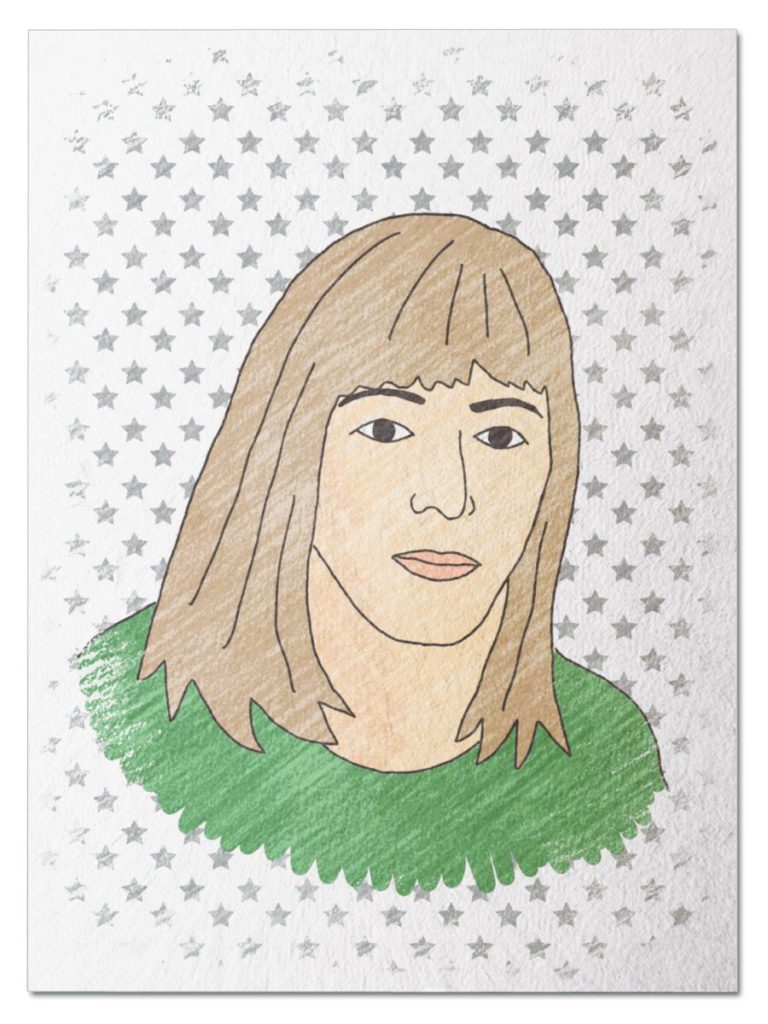
Culture Changer
She found her voice as a young woman advocating for her brother, who was born with special needs. She used her voice to build a career in humanitarian causes. Her passion for listening and learning led her to her life’s work – a worldwide ban on the use of landmines. She combined compassion for those injured by dormant mines with hard nosed negotiation and diplomacy to promote a Treaty that has now been signed by 142 nations. Join the 1997 International Campaign to Ban Land Mines World Tour and meet Jody Williams…
Her Ruby Shoe Moment
The Power of the Wand
Her Yellow Brick Road
Brains, Heart & Courage
Glinda’s Gallery
Just the Facts
Her Ruby Shoe Moment
Jody Williams was exhausted when she finally reached her hotel room in London. But she was too excited to sleep. It was May, 1993. She just wrapped up her first international conference regarding landmines. And it was a success. As coordinator for the International Campaign to Ban Landmines (ICBL), her job was to raise awareness of the danger that landmines pose throughout the world. And the conference brought the ICBL one step closer to its ultimate goal — a worldwide ban on the use of landmines.
 At the time, there were about 200 million landmines in over 80 countries around the world. They were left over from various conflicts and wars over the years, staying buried in the ground long after the armies left. They lay dormant in the ground, until someone disturbs them. Then they explode and kill or injure indiscriminately. In fact, over 25,000 people were injured every year from landmines.
At the time, there were about 200 million landmines in over 80 countries around the world. They were left over from various conflicts and wars over the years, staying buried in the ground long after the armies left. They lay dormant in the ground, until someone disturbs them. Then they explode and kill or injure indiscriminately. In fact, over 25,000 people were injured every year from landmines.
For the next four years, Jody worked tirelessly to get organizations around the world to join the cause. Sometimes it was tough to get organizations to work together, since they each had their own agendas. At one point, she called it a global chess match. It was even harder to convince governments to take action. Quite a few countries resisted her efforts, but she didn’t give up. And she had to be tenacious — most diplomats didn’t want to talk with her. Doors began to open, however, once the United Nations supported the ICBL’s work.
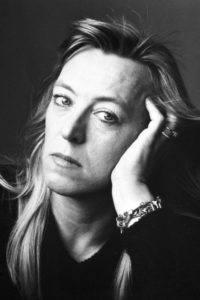
Nobel Foundation Archive
Then, the ICBL got the boost it needed. When it hosted its 1996 annual conference in Ottawa, Lord Axworthy (minister of foreign affairs) made a surprising announcement — he reiterated Canada’s commitment to a landmine ban and challenged the other countries to return in one year and sign a treaty.
Jody felt pressure to capitalize on the Axworthy Challenge. So ICBL went on the “1997 Landmine Ban World Tour” to build support for an international treaty. And Jody did whatever it took to get the job done. She organized events and conferences. She coordinated financial and medical aid for victims of landmines. She encouraged landmine survivors to speak out. She also had a bit of luck — Lady Diana joined the effort and gave ICBL instant publicity.
As the idea gained momentum, IBCL hosted a meeting of 89 countries to negotiate the terms of an international treaty. Even though the United States withdrew its participation, negotiations continued for two weeks in Oslo, Norway. On September 18, 1997, the countries agreed in principal on the terms of a treaty.
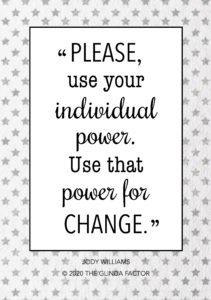 In December, 1997, 122 countries returned to Ottawa to sign The Convention on the Prohibition of the Use, Stockpiling, Production and Transfer of Anti-Personnel Mines and on their Destruction (the “Treaty”). It requires signatories to: (1) prevent the use, stockpile, or production of anti-personnel mines; (2) clear contaminated areas; and (3) provide aid to victims of mine injuries.
In December, 1997, 122 countries returned to Ottawa to sign The Convention on the Prohibition of the Use, Stockpiling, Production and Transfer of Anti-Personnel Mines and on their Destruction (the “Treaty”). It requires signatories to: (1) prevent the use, stockpile, or production of anti-personnel mines; (2) clear contaminated areas; and (3) provide aid to victims of mine injuries.
Since then, over 20 additional countries have approved the Treaty (excluding Russia, India, China, and the United States). More than 48 million stockpiled mines have been destroyed. And many minefields have been cleared around the world (3 countries declared mine-free).
The Power of the Wand
Within six years, Jody created a coalition of 1300 governments and organizations in over 85 countries. And the ICBL accomplished something most thought would take over 30 years. Just weeks after the Treaty was agreed upon, Jody got a call from the Nobel Committee. She and the ICBL were awarded the Nobel Peace Price. Jody hopes that her work will inspire others to make the world a better place. The key, she insists, is finding something that you are passionate about and not giving up.
Autumn Peltier is an example of someone who has taken Jody’s advice to heart. Autumn is a “warwe warrior” — she advocates for all humans to have access to safe clean drinking water. Autumn is part of the Wiikwemkoong First Nation and lives on Manitoulin Island in Ontario, Canada. At age 13, she was appointed the chief water commissioner for the Anishnabek Nation (which represents 40 native nations in Canada). In that role, she has raised awareness of the water crisis for indigenous people throughout Canada. More than 75% of Canada’s indigenous population lives under water advisories and must boil water before it can be safe to use.
Autumn spoke to the United Nations’ General Assembly about the human right to clean water on World Water Day (March 22, 2018). By then, she was already a seasoned advocate. And she has received a number of awards for her work. For example, Autumn has been nominated for the Children’s International Peace Prize three years in a row (2017-2019).
Her Yellow Brick Road
Jody spent years doing humanitarian work in Central America. Her first opportunity was at the Nicarague-Honduras Education Project (NHEP). The goal of NHEP was to open people’s eyes to the human rights violations in Central America through guided tours. Then, NHEP closed its door two years after Jody started, so she had to look for another way to make an impact.
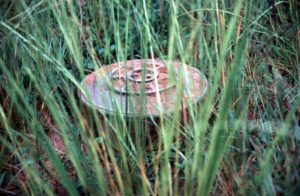
Landmine, ICBL
Jody turned her attention to El Salvador, which was in the middle of a brutal civil war. She joined Medical Aid for El Salvador and was in charge of the Children’s Project (children injured in war were brought to America for medical care). As the fighting increased, most humanitarian workers fled the country, but not Jody. She stayed in the country, even after she was threatened and her office was ransacked. Eventually, however, the work drained her and she needed a change.
After Jody returned to America, she attended a meeting by VVAF (Vietnam Veterans of America) about medical care for people who were injured by landmines. During the meeting, the parties discussed the fact that care, such as prosthetic arms and legs, was just a band-aid — the root problem was all the land-mines that remained in the countryside of war-torn countries.
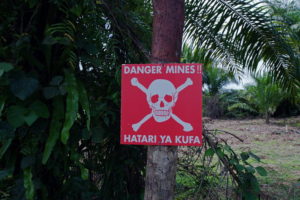
Landmine Warning Sign, United National Mine Action Strategy
Jody realized that landmines were “the perfect soldier” — they lie in wait indefinitely and wreak havoc when they are disturbed. They kill anyone who gets too close, whether it be a woman walking to get water, a child playing with a soccer ball, or a doctor racing to help someone in need. On top of it, most affected countries don’t have the resources to clear the land mines. De-mining is dangerous, and expensive and time-consuming. Something had to be done.
Jody became a fierce advocate to ban land-mines worldwide. She initially worked as a consultant for VVAF for months while she got herself up to speed on the issue. Then, it was time to coordinate with other organizations who had the same goal as VVAF. They needed to speak with one voice and pool their resources. In October of 1992, representatives from 6 organizations (Human Rights Watch, Medico International, Handicap International, Physicians for Human Rights, Vietnam Veterans of America Foundation, and the Mines Advisory Group) met in New York and created the ICBL. It was time for Jody to take their message to the world.
Brains, Heart & Courage
Jody learned the power of advocacy at an early age. Her older brother, Stephen, was born with disabilities. Her mom had the German measles while she was pregnant and Steve suffered brain damage as a result. He was deaf and was diagnosed with both learning difficulties and schizophrenia.
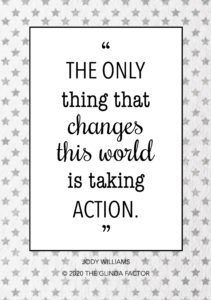 While growing up, her family rallied around Steve. He was bullied constantly by the neighborhood kids, just because he was different from them. And it made Jody angry. So she stood up to the neighbors and protected Steve. These childhood experiences prepared Jody for her future and gave her a unique perspective into the suffering of others. It also made her strong, compassionate, and comfortable with confrontation.
While growing up, her family rallied around Steve. He was bullied constantly by the neighborhood kids, just because he was different from them. And it made Jody angry. So she stood up to the neighbors and protected Steve. These childhood experiences prepared Jody for her future and gave her a unique perspective into the suffering of others. It also made her strong, compassionate, and comfortable with confrontation.
Jody was in college when students were questioning America’s involvement in the Vietnam War. She participated in peaceful protests on the University of Vermont’s campus, which gave her a taste for activism. It also helped her find her voice.
After graduation, Jody went on to get her masters degree in education (Spanish and English as a second language). She completed the international portion of her master’s degree by student teaching in Mexico. It was an eye opening experience, but made her realize that she wasn’t passionate about being a teacher. So she moved to DC and got a second masters degree in international studies from Johns Hopkins University. Jody had all the tools she needed for a humanitarian career.
Glinda’s Gallery
Just the Facts
- Jody was born on October 9, 1950 in Poultney, Vermont. She grew up in a strong Catholic family as the second of 5 children. Her father served in the Navy during World War II. They married when her mom was 16 years old, right after the War ended.
- Jody graduated from the University of Vermont in 1972 with a bachelors degree in humanities. Then, she received a master’s degree in education (Spanish and English as second language) from the School for International Training in 1976. She went on to earn a second masters degree in international studies from Johns Hopkins University in 1984.
- Jody married her high school sweetheart after graduating from college — they divorced three years later. She met her second husband, Stephen Goose, while working for ICBL.
- She was founding coordinator of ICBL from 1992-1998. She and ICBL were awarded the Nobel Peace Prize in 1997.
- After the Treaty was signed, Jody became an ambassador for ICBL for over 10 years. She continued to bring awareness to landmines, traveled around the world and promoted the Treaty.
- Jody is now chairperson of the Nobel Women’s Initiative, which was launched in 2006 by 6 women recipients. The goal of the Initiative is to empower women to change the world and support the causes important to them. It also brings attention to the persecution and treatment of women worldwide.
- Jody is a professor at the Graduate College of Social Work at University of Houston, Texas.
- Jody was named as one of the 100 most powerful women in the world by Forbes Magazine in 2004.
- April 4 is International Mine Awareness Day.
Want to Know More?
Vani, Supriya. Battling Injustice: 16 Women Nobel Peace Laureates. India: Harper Collins, 2017.
Williams, Jody. My Name is Jody Williams, A Vermont Girl’s Winding Path to the Nobel Peace Prize. Berkeley: University of California Press, 2013.
Williams, Jody and Shawn Roberts. After the Guns Fall Silent. Washington DC: Vietnam Veterans of America Foundation, 1995.
Zajonc, Arthur. We Speak as One: twelve Nobel laureates share their vision for peace. Denver: Peace Jam, 2006.
United Nations Mine Action Service coordinates the UN response to landmines worldwide.
“10 Questions for Jody Williams,” Time Magazine interview
“Jody Williams: A realistic vision for world peace.” Ted Talk, December, 2010.
